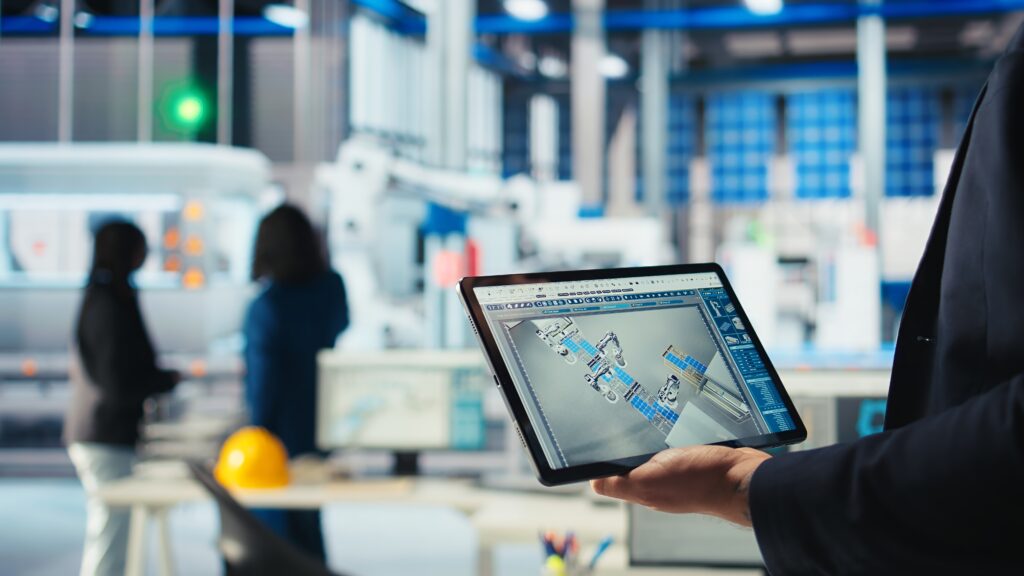In today’s competitive market, manufacturers are always trying to find ways to improve production efficiency to create a competitive advantage. How to maximize productivity while minimizing costs? When this problem was posed, the Manufacturing Execution System (MES) – Factory Production Management System was born and is increasingly becoming a trend that Vietnamese businesses are particularly interested in.
What is Manufacturing Execution System (MES)?
MES (Manufacturing Execution System) is a computer system that monitors the production area, control, logistics, and product history from input materials to finished products according to real-time. MES is an integrated system that monitors many factors at the same time (materials, people, machines), manages product quality, optimizes production processes and improves business efficiency.
MES can be applied in many diverse manufacturing industries: apparel, electronics, chemicals, and building materials,… especially in FMCG, food – beverage, and healthcare industries.
In today’s digital transformation context, the MES is an intermediary between the Supervisory Control & Data Acquisition System (SCADA) and the Enterprise Resource Planning System (ERP), and the Enterprise Resource Planning System (ERP). Machine Automation Process Control (PLC) system. These systems all play an essential role in automating manufacturing industries, managing instant updates in the ongoing production process with digitized reports, and replacing management. Post-production by manual report writing.
Why do businesses need MES systems?
The MES system is an inevitable trend in the manufacturing industries. The fierce competition in the global market makes it not enough to maintain stable production, but it is necessary to create its own competitive advantage. To do that, it is necessary to improve the ability to manage the product lifecycle, data management, and intelligent and optimal production management. Therefore, if your business is facing one of the common problems in products such as:
- Delayed information, resulting in untimely processing,
- Production interruptions, resulting in the production of goods that are behind schedule or of poor quality,
- Difficulty in innovating to catch up with market trends,
- Time-consuming, risky, and error-prone due to manual processes and paperwork
- Can not be managed visually, difficult to track because there are too many systems in the factory, discrete systems, not linked together,
- Having problems in traceability, document tracing,
Maybe, your business needs a MES system.
Main functions of the MES system
Typically the functions of an MES system include:
Product Quality Management
- Product specification management
The MES system stores product definitions and exchanges data with other information systems about standardized production rules, related documents, and certificates. This creates a unified information system to ensure that exactly what is produced meets the standardized specifications. - Traceability Management
MES creates real-time product traceability, tracking, search, and traceability records. This helps administrators understand the status of WIP and finished products, ensure product quality during production, and facilitate product recalls if any. - Real-time tracking and reporting
The data about products, workers or machines will be collected by the MES system, stored data, and given real-time reports. This helps businesses update error detection in the production process immediately. At the same time, MES also integrates quick technical solutions, minimizing defects in goods, and ensuring better product quality.
Production Process Management
Resource management
The Manufacturing Execution System supports the registration, management, and analysis of factory resources, ensures the availability and capacity of the resources, and minimizes production interruptions or product errors due to the weak capacity of the resources. force.
Production planning supervision
MES collects information from orders, and requirements from ERP systems or other enterprise planning systems, thereby making optimal use of available resources. At the same time, MES also monitors the production process, and completed orders of shipments, ensuring on-time production and delivery.
.
Production performance analysis
From updating the raw data from the factory, the analytical MES system provides useful information about the production status such as Inventory (WIP), Overall Equipment Efficiency (OEE), production efficiency, etc. export,…
Statistical Process Control
Most of the MES systems are equipped with statistical functions such as online histogram, Xbar-R, Xbar-S, P, Pn,… and limit calculations, thereby detecting the missing points. reasonable in the production process and provide solutions.
Integrate, and digitize processes
Information digitization
The information is digitized from the notepad into the web/tablet system and pushed the information from the SCADA system into a common data source. Improved problem solving of the environment
If you have any further questions on our Manufacturing Execution System MES-X, do not hesitate to contact us.
VTI – Innovation Technology Value
Hotline: (+84) 24 7306 9996
Email: [email protected]
Facebook: VTI
![[FREE EBOOK] Strategic Vietnam IT Outsourcing: Optimizing Cost and Workforce Efficiency](https://vti.com.vn/wp-content/uploads/2023/08/cover-mockup_ebook-it-outsourcing-20230331111004-ynxdn-1.png)





